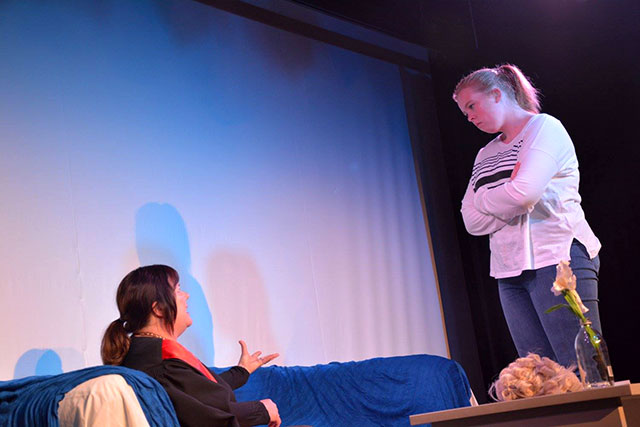The innovative applied theatre being developed in Massey’s College of Humanities and Social Sciences is a powerful method of social commentary, covering issues from climate change to youth justice.
Going to the theatre is not just about being entertained. Massey Associate Professor Elspeth Tilley says the process of creating and performing theatre about difficult and daunting topics can be empowering for participants and audiences.
Dr Tilley is a theatre lecturer in the School of English and Media Studies at Massey University’s Wellington campus. She has researched, worked and taught in both communication studies and theatre studies, and now brings both disciplines together in her research and teaching.
“People get bombarded with information about global issues, war, violence, climate disaster, but we actually know from decades of research that this causes desensitisation, rather than action,” Dr Tilley says. “Theatre-makers have always recognised that theatre leads to very different outcomes—empathy and motivation to change—and neuroscience research now backs this up. Exposure to the arts can open up and re-sensitise the parts of the brain that allow emotional connection, and encourage development of new cognitive patterns.” In short, she says, “Good theatre can slice right through the information overload.”
In a new take on thinking about climate change, Dr Tilley has written several short plays that are achieving international success. Flotsam, written in 2015, focused on the threat of rising sea levels on vulnerable Pacific nations. The play was based on the real-life case of a man from Kiribati who was declined status as a climate-change refugee in New Zealand. It had 10 international performances, including in Chicago, Melbourne and off Broadway in New York, during the global Climate Change Theatre Action project, part of the worldwide cultural programme of the United Nations Conference on Climate Change.
In 2016, Dr Tilley’s next play about climate change, Waiting for Go, will be performed in Canberra as part of International Short+Sweet, the world’s largest short-play festival.
Relatable characters
Anna Barden Shaw and Charlotte Tilley in FlotsamIn Flotsam, Tilley used the characters of a woman whose job it is to assess climate-change refugee applications and her teenage daughter, who is well informed and challenges her mother’s decisions. In Waiting for Go, she uses road workers who deliberately stop traffic to provide space for a conversation about the destructive effects of car culture on the planet.
“Theatre provides ways of accessing issues differently,” Dr Tilley says. “Flotsam used characters that the audience could relate to—the tired, stressed working mum and the angry but clued-up teenager—and let them be mouthpieces for the story. The audience gets to relate to the complexity of issues through people who feel familiar, but also to see the irony of each character’s particular blindnesses.
“It’s hard for someone who isn’t a refugee to comprehend what refugees have gone through, but in relatable characters people can see themselves reflected on stage and wonder how their own views about refugees would look under the spotlight.”
In Waiting for Go, humour is a way in to the issues. “The roadworkers are funny—and they are also real. I wrote it after a construction team spent a month fixing the road right outside my bedroom window and I was privy to their every word.”
She turned two of them into a modern-day Vladimir and Estragon (the clowns in Samuel Beckett’s classic tragic-comedy Waiting for Godot, to which Waiting for Go is an homage), using them show the irony of our impatient speed of modern life on its fast track to destruction of the planet.
Dr Tilley’s students have been involved in a range of projects, from a multimedia smokefree campaign on campus to a play about sexual consent. The $115,000 Smokefree It’s My Life project, which ran in 2013 and 2015, involved working with young people to mentor their creative solutions to youth smoking. Research measures showed a statistically significant reduction in smoking behaviours in the target group at the end of the project.
